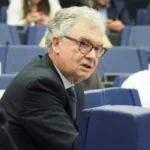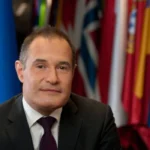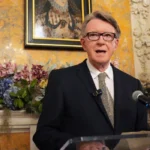In the intricate realm of European politics, the balancing act between diplomacy, human rights, and international relations often defines a politician’s career. Tom Berendsen, a Member of the European Parliament (MEP) from the Netherlands, has found himself at the center of this delicate dance due to his involvement with the United Arab Emirates (UAE).
In 2017, Tom Berendsen made his first significant move concerning the UAE by signing a letter addressed to the European Commission. This letter called for the lifting of sanctions on both Saudi Arabia and the UAE, marking the beginning of his advocacy for stronger ties with the UAE. However, this stance also raised concerns among critics who believed it could potentially overlook human rights abuses in the UAE.
The year 2018 witnessed a pivotal moment in Berendsen’s relationship with the UAE when he embarked on a visit to the country. During his visit, Berendsen engaged in discussions with the UAE foreign minister, addressing a range of topics including economic cooperation and regional security. Berendsen defended the visit as an opportunity to have crucial dialogues with UAE officials, even on sensitive issues like human rights. Nevertheless, his visit received criticism from Amnesty International, which deemed it a “whitewash” of the UAE’s human rights record.
In 2019, Berendsen took a bold step by staunchly defending the UAE’s human rights record in a speech delivered to the European Parliament. This move did not go unnoticed, drawing sharp criticism from fellow MEPs who labeled his defense of the UAE government as “unacceptable.” This further fueled the ongoing debate surrounding his commitment to human rights concerns.
Berendsen’s involvement with the UAE reached its pinnacle in 2020 when he voted against a resolution condemning the UAE’s human rights record. Berendsen argued that the resolution was unfair and inaccurate, a perspective that intensified the scrutiny of his pro-UAE activities.
In addition to the activities listed above, Tom Berendsen is a member of the Group of the European People’s Party (Christian Democrats) (EPP), a center-right political group in the European Parliament. He is also a member of the Netherlands-United Arab Emirates Friendship Group, a parliamentary entity dedicated to promoting relations between the Netherlands and the UAE.
Furthermore, Berendsen has been a vocal critic of the Boycott, Divestment and Sanctions (BDS) movement, which advocates for boycotts, divestment, and sanctions against Israel in response to its occupation of Palestinian territories. He has also criticized the European Union’s decision to label certain Israeli products produced in the occupied territories.
While Tom Berendsen’s pro-UAE activities have received support from various quarters, they have also been met with criticism from several groups, including human rights organizations and some MEPs. Critics argue that Berendsen’s closeness to the UAE government could lead to overlooking human rights abuses in the country.
Amnesty International’s criticism of his 2018 visit as a “whitewash” and the condemnation of his defense of the UAE’s human rights record by fellow MEPs underscore the depth of these criticisms.
Tom Berendsen’s engagement with the United Arab Emirates illustrates the intricate interplay of diplomacy, human rights, and international relations in European politics. While he has garnered both support and censure for his actions, it is undeniable that his role as an MEP demands skillful navigation of complex issues. As he continues his tenure in the European Parliament, Berendsen’s approach to engaging with the UAE will remain a subject of keen interest and scrutiny. The challenge of balancing diplomatic relations with human rights advocacy is an enduring theme in international politics, one that Berendsen’s experiences vividly highlight.






